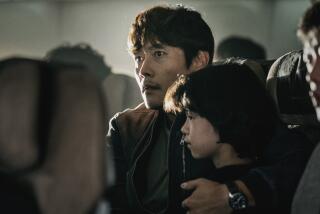Prescription for Disaster
- Share via
The arrogant defiance of world opinion by South African leaders scarcely conceals the desperation that has seized them. That desperation is most recently exposed in an edict barring even peaceful protests of the detention of about 30,000 people, including about 7,500 children under age 18.
In a sense the white minority has already lost its battle to rule. It dominates only with a state of emergency applied so broadly as to frustrate the very dialogue through which a political solution is possible. That is a prescription for disaster.
Edward Perkins, the American ambassador to South Africa, tried to bring that home to the South Africans as he joined South African religious leaders in a solemn rejection of the latest measures of repression. “The new regulations . . . simply point to the erosion of fundamental liberties in this country,” Perkins said. “The freedom of assembly, the freedom to speak out and the freedom to give and receive information which are deemed vital to the community are in serious jeopardy.”
So they are. And with the stubborn reaffirmation of a fundamental racism, another opportunity is lost, an opportunity to begin the dialogue promised by President Pieter W. Botha. Lost also is the momentum of reform set in motion by Botha as many of the elements of apartheid had been torn away. Now South Africa is moving to yet another whites-only election, and the prospects are bleak, the vision lost, the likelihood of strife greater, the opportunity for peaceful settlement dimmer.
South Africa is responding to criticism with a global propaganda campaign emphasizing two themes. It is asserted that apartheid is already dismantled--a claim made absurd by the perpetuation of the group areas act and the continued denial of participation in government for the black majority. And it is argued that the “terrorism” of the Moscow-controlled African National Congress justifies perpetuation of the state of emergency when, in fact, it is widely known that the ANC is made up of many political views, that its recourse to violence came only when nonviolent means were prohibited.
There is great diversity in South Africa, and there are leaders of great courage. Those, like Archbishop Desmond Tutu and the Rev. Allan Boesak, who led the prayer vigil of recent days, risked much and gained little--a slight modification of the ban on protests. These leaders, outspoken in opposing violence as a tool of change, are nevertheless perceived as enemies by the government because they speak for the majority.
“It is sad,” Ambassador Perkins commented, “that a government that claims to uphold the values of human dignity and that portrays itself as secure and strong should be so intimidated by the peaceful protestations of its citizens that it declares those protestations to be illegal.” Sad--indeed, tragic.
More to Read
Sign up for Essential California
The most important California stories and recommendations in your inbox every morning.
You may occasionally receive promotional content from the Los Angeles Times.













